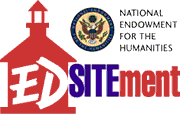 |
||
  |
||
|
|

|
||
Essay: Lesson Plans
| The Red Badge of Courage: A New Kind of Courage
In The Red Badge of Courage, Stephen Crane presents war through the eyes —and thoughts —of one soldier. The narrative’s altered point of view and stylistic innovations enable a heightened sense of realism while setting the work apart from war stories written essentially as tributes or propaganda.
|
| The Red Badge of Courage: A New Kind of Realism
The Red Badge of Courage’s success reflects the birth of a modern sensibility; today we feel something is true when it looks like the sort of thing we see in newspapers or on television news.
|
| “Shooting An Elephant”: George Orwell's Essay on his Life in Burma
George Orwell, is today best known for his last two novels, the anti-totalitarian works Animal Farm and 1984. He was also an accomplished and experienced essayist. Among his most powerful essays is the 1931 autobiographical essay "Shooting an Elephant," which Orwell based on his experience as a police officer in colonial Burma. This lesson plan is designed to help students read Orwell's essay both as a work of literature and as a window into the historical context about which it was written.
|
| Declare the Causes: The Declaration of Independence
Help your students see the development of the Declaration as both an historical process and a writing process through the use of role play and creative writing.
|
| Edith Wharton: War Correspondent
Through reading chapters of Edith Wharton's book, Fighting France, From
Dunkerque to Belfort, students will see how an American correspondent recounted
World War I for American readers.
|
| Evaluating Eyewitness Reports
Practice working with primary documents by comparing accounts of the Chicago Fire and testing the credibility of a Civil War diary.
|
| Introducing the Essay: Twain, Douglass, and American Non-Fiction
The essay is perhaps one of the most flexible genres: long or short, personal or analytical, exploring the extraordinary and the mundane. American essayists examine the political, the historical, and the literary; they investigate what it means to be an "American," ponder the means of creating independent and free citizens, discuss the nature of American literary form, and debate the place of religion in American society.
|
| Jack London's The Call of the Wild: “Nature Faker”?
A critic of writer Jack London called his animal protagonists “men in fur,” suggesting that his literary creations flaunted the facts of natural history. London responded to such criticism by maintaining that his own creations were based on sound science and in fact represented “…a protest against the ‘humanizing’ of animals, of which it seemed to me several ‘animal writers’ had been profoundly guilty.” How well does London succeed in avoiding such “humanizing” in his portrayal of Buck, the hero of his novel, The Call of the Wild?
|
| Martin Luther King, Jr., and the Power of Nonviolence
Students learn about Martin Luther King, Jr.'s philosophy of nonviolence and the teachings of Mohandas K. Gandhi that influenced King's views.
|
| Metaphorical Gold: Mining the Gold Rush for Stories
Explore the Alaskan Gold Rush by "mining" EDSITEment resources for primary texts and period photographs. Just as writer Jack London discovered "metaphorical gold" in the Yukon, students can search several online databases for period details that will enhance their own narratives based on the Gold Rush era.
|
| Pearl S. Buck: “On Discovering America”
American author Pearl S. Buck spent most of her life in China. She returned to America in 1934, "an immigrant among immigrants…in my native land." In this lesson, students will explore American attitudes toward immigration in the 1930s through Pearl S. Buck's essay, "On Discovering America." They will explore the meaning of the term "American" in this context and look at how the media portrayed immigrants.
|
| The Industrial Age in America: Robber Barons and Captains of Industry
How shall we judge the contributions to American society of the great financiers and industrialists at the end of the nineteenth and beginning of the twentieth centuries? In this lesson, students explore a variety of primary historical sources to uncover some of the less honorable deeds as well as the shrewd business moves and highly charitable acts of the great industrialists and financiers, men such as Andrew Carnegie, J. Pierpont Morgan, John D. Rockefeller, and Cornelius Vanderbilt.
|
  |
||
| EDSITEment contains a variety of links to other websites and references to resources available through government, nonprofit, and commercial entities. These links and references are provided solely for informational purposes and the convenience of the user. Their inclusion does not constitute an endorsement. For more information, please click the Disclaimer icon. | ||
| Disclaimer | Conditions of Use | Privacy Policy Search
| Site
Map | Contact
Us | ||
